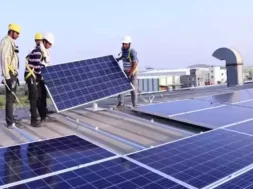
Hawaii, South Korea partnering on $4M experimental solar grid in Kailua-Kona
Hawaii and South Korea are partnering on an experimental type of microgrid technology at a green energy compound in Kailua-Kona, the state announced this week.
The solar-plus-storage grid at the Hawaii Ocean Science and Technology Park will have 500 kilowatts of new photovoltaic panels and a 750-kilowatt-hour energy storage system, with an artificial intelligence component. It is expected to be completed sometime in 2022.
The South Korean government, through the Korea Institute of Energy Technology Evaluation and Planning, or KETEP, is contributing $2 million to the project of about $4 million, with most of the rest being matched by the Natural Energy Laboratory of Hawaii Authority, NELHA, which operates the HOST Park.
Various entities from South Korea will research the grid’s use of AI to boost battery efficiency, the goal being an increase of 30%, NELHA Executive Director Gregory Barbour told Pacific Business News.
“It’s a perfect test bed for them. It’s all in one place. We’re a state agency so we could match [$1.8 million, and provide the land],” Barbour said. “We get free power forever. It’s all free.
They have to maintain it for 20 years. It’s a heck of a deal for us.”
The University of Hawaii’s Hawaii Natural Energy Institute conceived the alliance, which also includes energy AI company Encored, LG Electronics, Seoul National University, and the Gwangju Institute of Science and Technology.
Gov. David Ige signed off on a memorandum of understanding in 2015 between the state and South Korea’s KETEP to look into mutual green energy solutions.
“Projects like this demonstrate Hawaii’s commitment to building a clean energy economy through the deployment of cutting-edge technologies,” Ige stated this week.
“It also highlights Hawaii’s growing role as a test bed for innovative renewable energy projects in the Asia-Pacific region.”
Chris Ahn, energy storage system (ESS) business division leader at Seoul-based LG Electronics, stated, “This is an extension of our commitment and worldwide interest in developing and expanding renewable energy-based, self-sustainable microgrids, in which ESS plays a critical role. We are deploying some our latest advanced technology as part of this project.”















